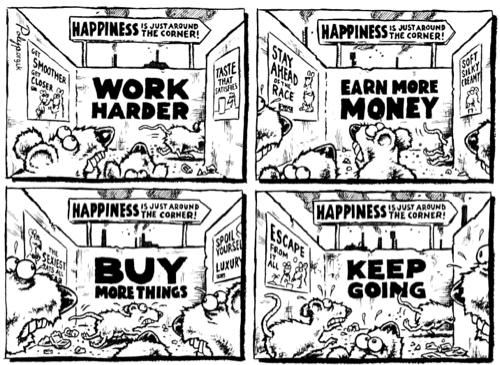3 of society's biggest lies
Certain topics in life are not to be spoken about or we suffer from cognitive dissonance (self-delusion). Some of these topics are better described as stories. These stories are there to help form society, without them where would be the hope? The truth is these stories are fiction just like religion. Whether you're religious or not, there's a good chance you believe many of society's lies. The question is, do you want the unpleasant truth or to maintain blissful ignorance?
1) Marry for love
No one knows how much of GDP is dedicated to "love" but it will be ginormous. Everything from wedding dresses, music lyrics, dating apps and chocolate. Society is obsessed with love, it's big business. Finding love is heralded as one of the most important things in life.
This idea, however, is new, very new in fact. Prior to the early 19th century, the reason for having a partner and family was for survival. Spouses were workmates to help produce food, clothing and expand the family labour force. The Industrial Revolution changed all of this. Increased efficiencies meant people could meet many of their basic needs without a partner. Because of this, there needed to be a new reason for marriage so it was re-invented and changed from workmate to soulmate.
Love in prehistoric time
Going back before the agricultural revolution, having multiple partners may have been the norm. Proponents of this theory point to women's ability to have multiple orgasms and making noise during sex. It's then argued this was a prehistoric mating call to encourage more men to join and this would make breeding more successful.
Whether you believe this argument or not, partible paternity is harder to dismiss. This is the belief that children have more than one father based on who the mother had intercourse with. Children with multiple male providers have a distinct survival advantage. This ideology is present today within tribes of South America, India and Polynesia which could be a looking glass into how we all (or some of us) once lived.
No one knows what relationships looked like thousands of years ago. But we have clues from the past and evidence from the present with high rates of infidelity and divorce. I don't take these clues as supporting evidence that we should all be part of a polyamorous orgy but it does suggest society has an unrealistic view on what's normal and what yields longterm happiness. Marrying only for love is probably a bad idea.
It's a good idea to have a lot in common because oxytocin (the love hormone) has an average lifespan of 4 years. Theories for why monogamy came about, include the preserving of family wealth and the prevalence of STDs, regardless it's likely it wasn't because of love.
2) Follow your passion
"Choose a job you love, and you will never have to work a day in your life"
Just as marriage stopped being about need and became about love, so did work. "Follow your passion" has been the defacto career advise for a sizable part of the population from friends, family and the education sector. However, for the vast majority, this is terrible advice.
Probability
What's the probability of becoming a successful singer, book writer or Premier League footballer? The odds suggest you're more likely to end up working in a karaoke bar, writing clickbait articles for a newspaper you hate and becoming a personal trainer in a gym. Our brains are wired to make decisions based on probability which is based on experience. You have no experience of "following your passion" which means you're more likely to make a bad decision. Instead, look at things objectively.
You'll change your mind
There's a good possibility you'll have different passions as time goes on. I'm a completely different person compared to who I was when starting out my career. I can't even remember what my passions were when I was entering the market place. You get a better picture of who you really are and what you enjoy when you grow older and wiser.
Work to live
"Work keeps at bay three great evils: boredom, vice, and need"
Voltaire
Voltaire has it right. We need to work to put food on the table, most people would be bored if they didn't work, filling time with bad habits; alcohol, scrolling social media, gambling (I know people like this). Too many people live to work.
Instead, making work serve your interests is a much better way to live. You just need to have some, I know too many people that consider Netflix, watching football and going to the pub as activities.
Life will become significantly richer if you have passions outside the workplace. Let's face it, you'd need to be deranged to be passionate about sitting in a cubicle and sending emails all day. Yet this is what the market place is flooded with. I get it, if everyone heeded my advice then we'd have no music to listen to or football to watch. But unless you're a child prodigy chess player then instead of attempting to become the next grandmaster, you're better off knuckling down with Excel and becoming an accountant which pays for your next chess holiday in Reykjavik.
3) Money brings happiness
“I think everybody should get rich and famous and do everything they ever dreamed of so they can see that it’s not the answer.”
Jim Carrey
Money makes you happy is one of society's biggest lies. Yes, food and shelter are necessities so a certain amount is needed but buying more clothes, handbags and gadgets are just filling a void. Although you receive a “bump” of happiness when you buy something new, it’s temporary and you return to your previous level. This means you’re back to the shops getting your next fix and you end up on an endless treadmill of consumption. Psychologists refer to this recurring revision to baseline happiness as hedonic adaptation, also referred to as the hedonic treadmill.
Anecdotally, the wealthy people I know don't strike me as happy and are constantly stressed. Life is about so much more, for starters: health, relationships, purpose, mastery and experiences. In summary, don't obsess over money, instead, spend that energy on building relationships, learnings and finding a purpose.
Wrapping up
I know there will be counterarguments to some of my points, such as "so and so has been married for 75 years and love each other dearly" and "my mate's mate started a band after dropping out of college and now they're Coldplay". However, this is no different to that person we all know that knows someone who smoked 40 cigarettes a day and lived until they were 95. It's certainly possible but not good advice for the general population.







